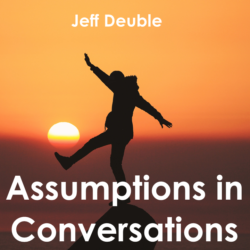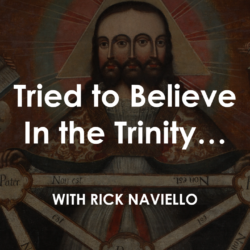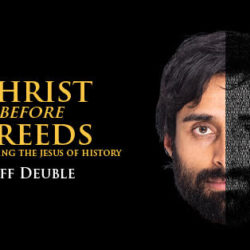Eric Miller begins by covering Alexander and Thomas Campbell’s beliefs about the Trinity. Then he talks about his own experience as a non-Trinitarian in the Independent Christian Churches community. He explains how the Christian Churches have become stricter on this issue in recent years. We discuss the possibility of reforming his church to be more in line with the tolerance expressed by Campbell and Stone in the early years.
Listen to this episode on Spotify or Apple Podcasts
—— Links ——
- Check out Eric Miller’s YouTube channel here
- See more episodes about the Trinity
- More about Jeff Deuble and his book Christ before Creeds here
- Support Restitutio by donating here
- Designate Restitutio as your charity of choice for Amazon purchases
- Join our Restitutio Facebook Group and follow us on Twitter @RestitutioSF
- Leave a voice message via SpeakPipe with questions or comments and we may play them out on the air
- Intro music: Good Vibes by MBB Attribution-ShareAlike 3.0 Unported (CC BY-SA 3.0) Free Download / Stream: Music promoted by Audio Library.
- Who is Sean Finnegan? Read his bio here.







Another interesting discussion that highlights how important it is for people (if they can) to impartially and informedly think for themselves – rather than automatically succumb to conformism and ‘groupthink’. The Christian religion is far too important to be left entirely in the hands of other people, and the Biblical evidence ideally needs to assessed in adequate depth, for ourselves.
A reason why the synoptic Gospels not infrequently focus on the Pharisees may be because any Christian denomination, sect, party or community is liable to become ‘Pharisaic’ (arrogant, intellectually presumptuous, loveless, closed minded) if it takes itself over seriously. This is one of the unfortunate corollaries of ‘groupthink’.
Great stuff, very informative.
I’d love to get more sources or a list of all the various Arian Christians of the Barton-Stone Restoration movement, as that information I’ve found isn’t so easy to come by online.
May be Charles Taze Russell was indirectly one of them ?
Thank you, Sean for these last two episodes. And thank you Eric for your integrity and heart for the things of God and for the Restoration Movement. I was a pastor of an Independent Christian Church of the Stone-Campbell Restoration Movement in Florida from 2007 through 2017. During my time pastoring that church, I was compelled by Scripture and my own study of early Christian writings to abandon certain of their doctrines, including immortality of the soul, eternal torment, and lastly Trinitarianism. During those years, as I studied and changed my views, I shared my doubts and reasonings from Scripture with them and brought that church along on my theological journey successfully. Of course, some members left, some elders resigned. But the search for truth above all else, and my attempting to publicly refine the best objective process and hermeneutical principles, was always at the forefront. My interactions with other pastors within the movement was limited, but I found little interest among any of them in reexamining the typical Evangelical doctrines which the movement holds.
I am retired now, and my wife and I attend a local church affiliated with the Church of God General Conference. My primary difference with them is the issue of preexistence. My view is very close to Eric’s view, although like Barton Stone, I do not classify it as Arian. The key difference with Arianism is the issue of whether the Son was “begotten” (out of God) at the beginning of the creation week (our view) vs. “created” by God at the beginning of creation week.
In any case, my heart is very much devoted to the original philosophy of the Restoration Movement which had Unitarians, Arians, and Trinitarians within the same movement without questioning each other’s salvation.
Sean’s questions about how to possibly open the Stone-Campbell movement today to be more inclusive, at least having some liberty to disagree and dialogue, is a great ideal. But from my experience there is little possibility of that. I would also point out that in my experience Biblical Unitarians can be just as averse to accepting other Christians or allowing them opportunities in ministry unless they firmly deny preexistence. I see the exact same problem with the Unitarian Restoration movements as I saw in the Stone Campbell Restoration Movement.
Hi, Tim,
You make some interesting points (theological and sociological).
I also saw your recent comment on Matthew 28:19. There’s an interesting paper by the Christadelphian scholar Dr. Andrew Perry, entitled “Matt 28:19 and a Hebrew Matthew”, on the website ‘www. Academia[dot] edu’. He discusses the view that Matthew’s Greek Gospel (which includes the longer ending of Matthew 28:19) derives from his earlier Hebrew Gospel, which contained the shorter (‘Eusebian’) variant of Matt. 28:19. Perry’s thesis is that Matthew would have regarded both of his Gospels as authoritative, but his Hebrew Gospel relatively quickly fell out of wide Christian usage. The textual variants of Matthew 28:19 therefore, may both derive from Matthew.
Hi John,
Good-ish to meet you. :). I will definitely take a look at Dr. Perry’s article. Thanks.